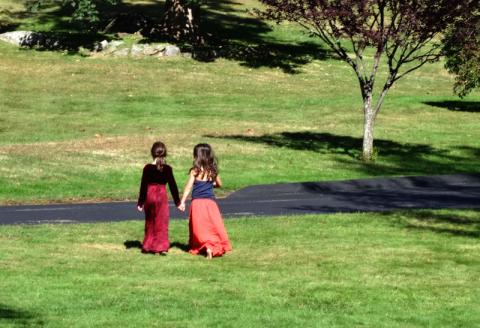For many centuries, philosophers and scientists have been debating human knowledge: its nature, limits and origin. On this last point, we still are trying to understand how much the human being is born knowing and how much he discovers throughout his life. From the moment that we assume the position of those who defend that we are not born knowing, we start to face another question: how then do we learn what we need to live in this world?
One of the answers, common and familiar for almost everybody, states that learning only happens under the orientation of one or more guides who already know something. Thus, somebody is going to show us, to direct us towards the important knowledge. Without these "guides", we would be completely lost. Maybe, that is why the non-directive educational approaches cause so much astonishment and are considered absurd by so many people. However, there is at least one more type of answer: learning happens when we look for the necessary solution to solve a problem. This answer does not reject the importance of guides; however, it does not affirm that they are the only source of knowledge. In addition, this leads to new questions: what, or who, can serve as a "guide". When is a "guide" important, and when is it unnecessary, or even, harmful? Who is to decide when it is the right time to look for this or that source of knowledge? How do we get the knowledge we need from the different sources? Is it possible for another person to anticipate and to determine which the useful knowledge is for anyone? Sudbury's educational spaces embrace that other type of answer: learning results from personal searches. It does not mean, however, that there is no "orientation" at all, but certainly implies that there is not any kind of "direction". What does it mean, in practical terms? Maybe a metaphor could help us to better answer this question. Let's imagine that each person's life is a trip, a walk on foot through different trails, and that the general goal of all learning is to know the paths, to know how to engage with other travelers, to better plan the routes all the time, to be prepared for contretemps and deviations along the way, to know how to choose what to put in your backpack and where to stop to rest, etc. Those who believe that we all need direction will defend the importance of always (or at least, almost always) having a guide by our side. Yet, the Sudbury model of education is based on the idea that none of us know beforehand which tracks to follow, nor where the trip will take us, and even less when it comes about trips of other people; but we all have the abilities and tools that make possible personal discoveries and the accomplishment of our objectives. Thus, there are not one or two (or ten, or twenty) guides, or "more experienced travelers", which we all need to follow. In fact, what we have is an abundance of different sources of orientation: the weather, footprints in the road, vegetation, the behavior of other travelers, advice from the most experienced travelers, our own intuition, all the knowledge we have accumulated along the path.
In Sudbury educational spaces, the staff members (responsible for the general functioning of the space, for the security of students, for supporting initiatives from the students, etc.) will not provide direction, for this is seen as unnecessary and, even worse, as harmful. In the same manner that an unsolicited direction would distract a traveler who seeks for (external and internal) signals to orient himself in his track, any well-meaning person who tried to help a student would, at least, distract him from his activities, delaying his discoveries, instead of speeding them up. Ultimately, there is a very offensive message behind unsolicited aid that reveals lack of confidence in the other person: “Without me, you would never be able to discover this thing that is so important.”
However, the travelers are not alone. Sudbury schools represent, in a sense, a collective trip: a group of people, a community, that come together to make a journey where everybody is free to choose their own trails, to decide democratically how the group is going to work and behavior rules that will help each one to look for his/her objectives. It means that every member of the community can choose to walk alone or in groups, all the time or only partially, although at the same time they are part of a community of travelers who will give support to each other, when necessary. In this environment, travelers will learn how to find all the orientation they need, inside and outside themselves, succeeding and making mistakes, losing and finding their tracks, observing other travelers and analyzing themselves. Thus, they will create a completely custom and dynamic map for this singular trip that is the life of each person.


